Considering the events of the past two years, perhaps no occupation has been more impacted than that of the travel manager. From overseeing permissions and approvals, keeping travelers safe and informed, renegotiating supplier contracts and rewriting policy, travel managers have been on quite a ride. As business travel slowly rebuilt itself after the Covid-induced 2020 shutdown, so have travel managers. Determining where travel was allowed at any given time and which trips were essential or optional often fell on their shoulders. And there is no time to rest, since managing the recovery might be even more challenging.
For some, Covid-19 was a time of reckoning, an opportunity for travel managers to show their value to the organization not just operationally but also strategically. For others, it became a burden to take on more and more responsibility as colleagues were furloughed, dismissed or resigned. Overall, corporations have learned to value their contribution—at least monetarily. BTN’s 39th annual Travel Manager Survey attests to the growing need for companies to recognize—and retain—their travel managers.
At an overall average of $128,439—including salary, bonuses, and incentives—travel manager compensation is at an all-time high in 2022. Average compensation for the 263 respondents in this year’s base rose 11 percent over the previous year’s respondents and 12 percent over respondents in 2019. Clearly, companies have had to up the ante to keep travel managers happy. In some cases, increases recognized new responsibilities as positions were consolidated. For others, it was the reward for a job well done and acknowledgment of their strategic role in shaping company policy. Of course, inflation (9 percent as of July) will take a bite out of that 11 percent annual increase, but travel managers still should come out ahead compared to previous years.
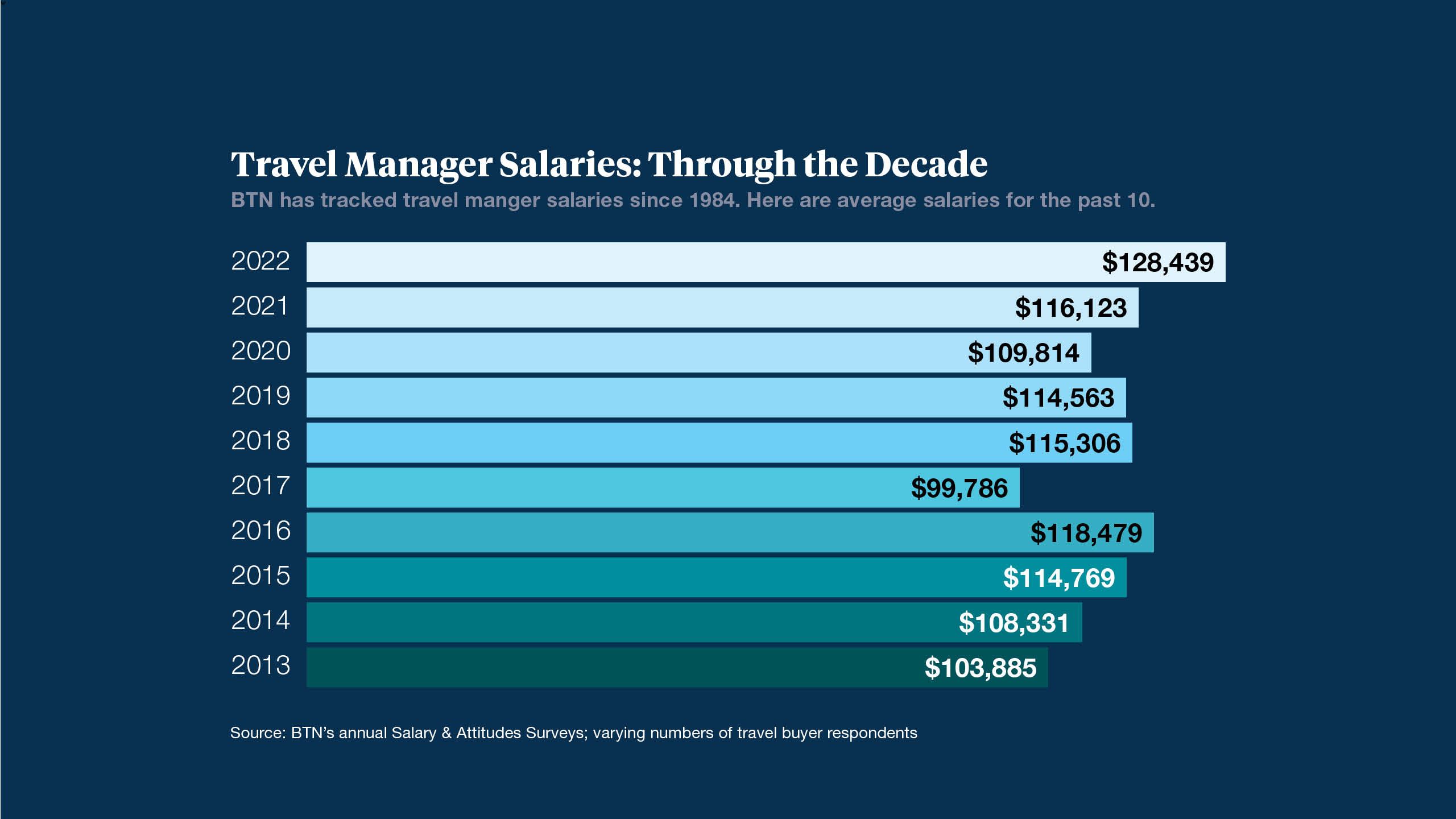
Not surprisingly, the higher the travel spend, the higher the salary, for the most part. Companies with U.S.-booked air spend volume of over $40 million pay their travel managers $170,331 on average, while those with spend of $2.1 million to $12 million are paid far less ($124,483).
Years in service also count, but to a point. Those with less than four years in service make $115,539 on average while those with at least 21 years bring in more than $140,000. For those lifers, however, hanging onto one job may not bring enough reward. The difference in average compensation between those with 21 to 30 years of experience and those with over 30 years was just $919.
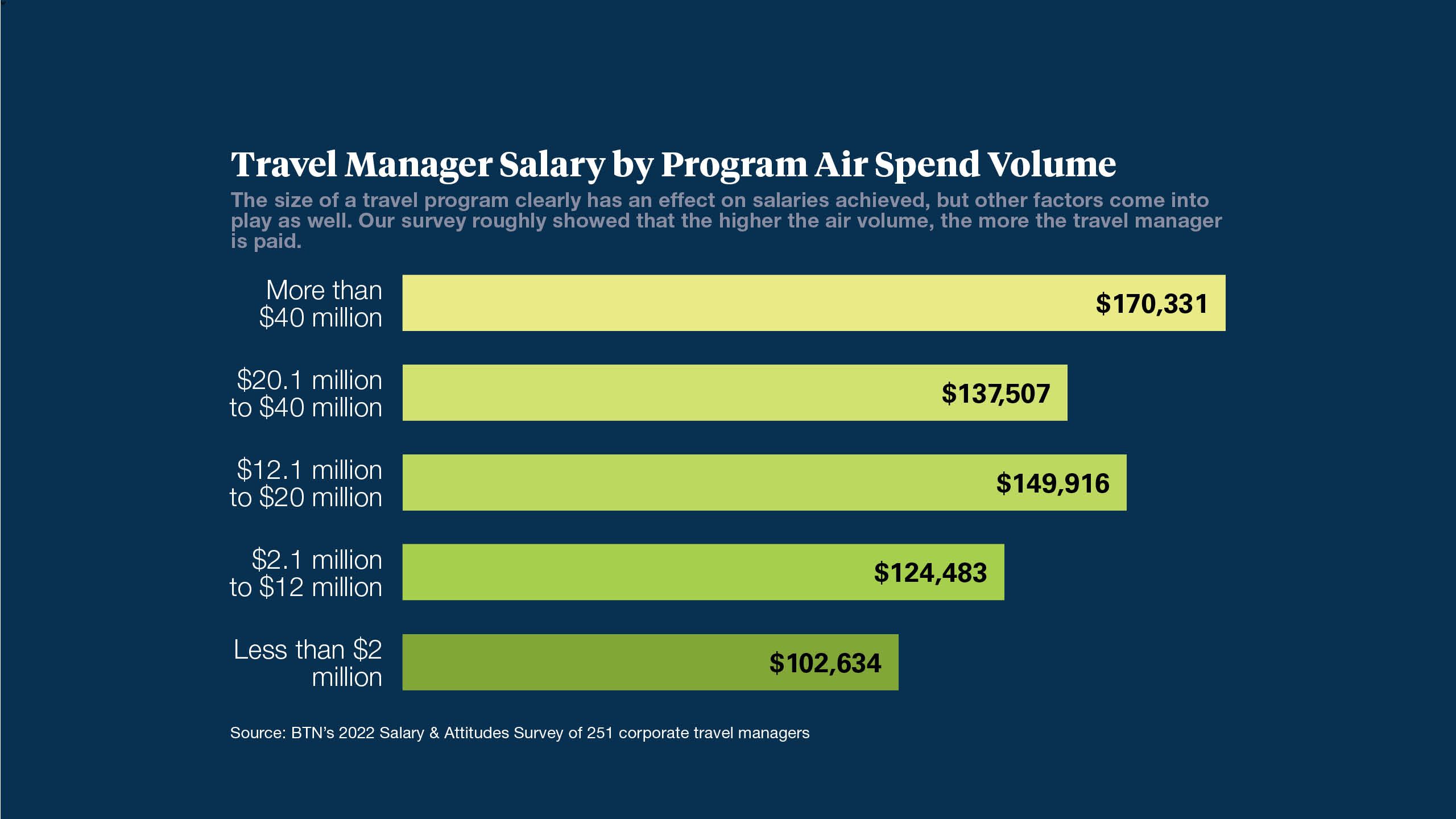
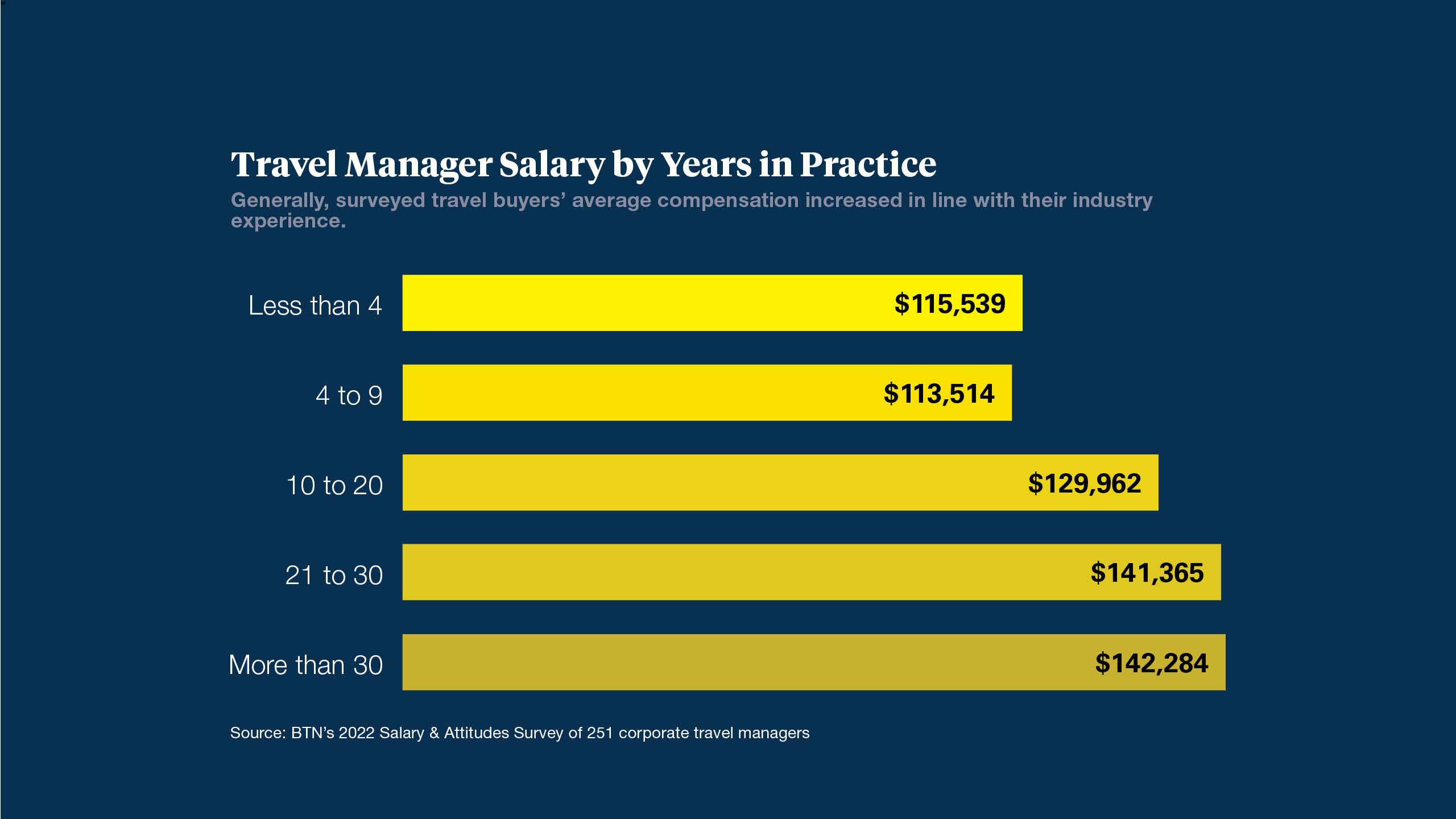
Overall, there still is a big salary discrepancy between the sexes. Although most respondents identified themselves as female (67 percent), the average salary for those who identified as male was 19 percent higher—$121,254 for women to $144,088 for men. There has been some improvement in the salary gap, but not much. For every dollar a man made, a woman made 84 cents, but that was up from 81 cents in 2019.
Looking closer at the survey data, seniority level is a key driver of the gender-based salary discrepancy. Most notably, every survey respondent who reported having an assistant- or coordinator-level role in travel management was a woman. Yes, you read that right. There was not a single male assistant or coordinator in the survey. As the travel role becomes more senior, the more likely it is to be held by a man. Still, in an industry that is dominated by female workers, 55 percent of the most senior travel management roles listed in our survey were held by women. That was not enough, however, to offset the salaries of the number of women in junior roles making the least.

Long List of Responsibilities
Travel managers have myriad responsibilities, and the list just gets longer, but making decisions regarding supplier relationships and user technologies remains on top. The largest percentage, eight in 10, said their current responsibilities include selecting or recommending business travel suppliers, and three-quarters cited selecting or recommending technologies to manage travel. More than seven in 10 set corporate policies, negotiate rates (for transient travel) and manage business travel costs. Only about a third plan, arrange or approve business travel for individuals or select or recommend meeting facilities and destinations.
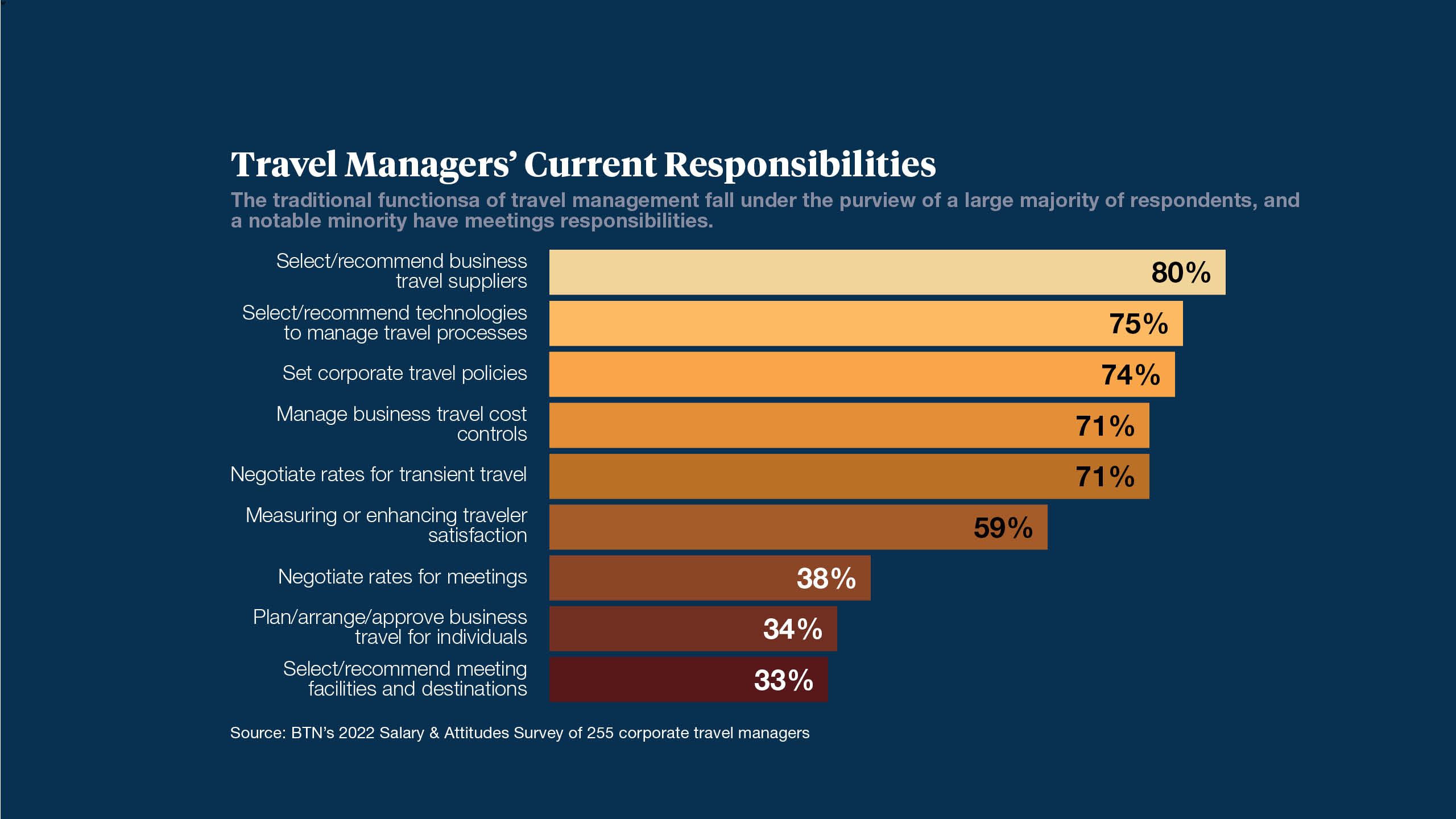
A Shift in Focus
The pandemic shifted some companies’ primary travel management focus from reducing cost to more traveler-centric measures, such as satisfaction and security. In these cases, responsibility to the individual rose in importance compared to obligation to the budget. Employee health, safety, efficiency, and satisfaction took precedence, especially since there were fewer trips to manage, and each trip required more scrutiny. More than six in 10 respondents cited a shift in focus toward traveler wellness, safety, and security management over the past year.
Aligning travel expense with corporate goals, negotiating rates, assessing risk and measuring traveler satisfaction are just some travel manager responsibilities that require expertise in technology. To stay updated, one-half of travel managers have sharpened their focus on program innovation and new travel technology and services. And as travel managers continue to play a more strategic role in the organization, roughly four in 10 have placed increased emphasis on travel data analysis and reporting alongside travel program communications, like marketing, social media, intranet and other avenues.
The Virtues of Communication
Effective communication has become vital for a safe and effective travel program, and nearly four in 10 have prioritized travel program communications. There are policy, expense and approval changes happening internally, and constant travel alerts externally. Travel managers have had to maneuver around many obstacles during Covid, such as testing, quarantines, and other government restrictions on top of limited inventory, travel management company turnover and supplier shutdowns. Now they must manage an overstressed travel ecosystem: airline cancellations and delays, misinformation regarding testing requirements, missed meetings and subpar service levels.
“I spend a lot of time explaining to people how to manage their anxiety. I feel like a corporate therapist,” wrote one manager. “Managing expectations while navigating a chaotic travel supplier landscape,” has become a bigger part of the job, said another. One travel manager spoke of the challenge of “managing the explosive return to travel and in-person events and hiring additional teammates to support it.”
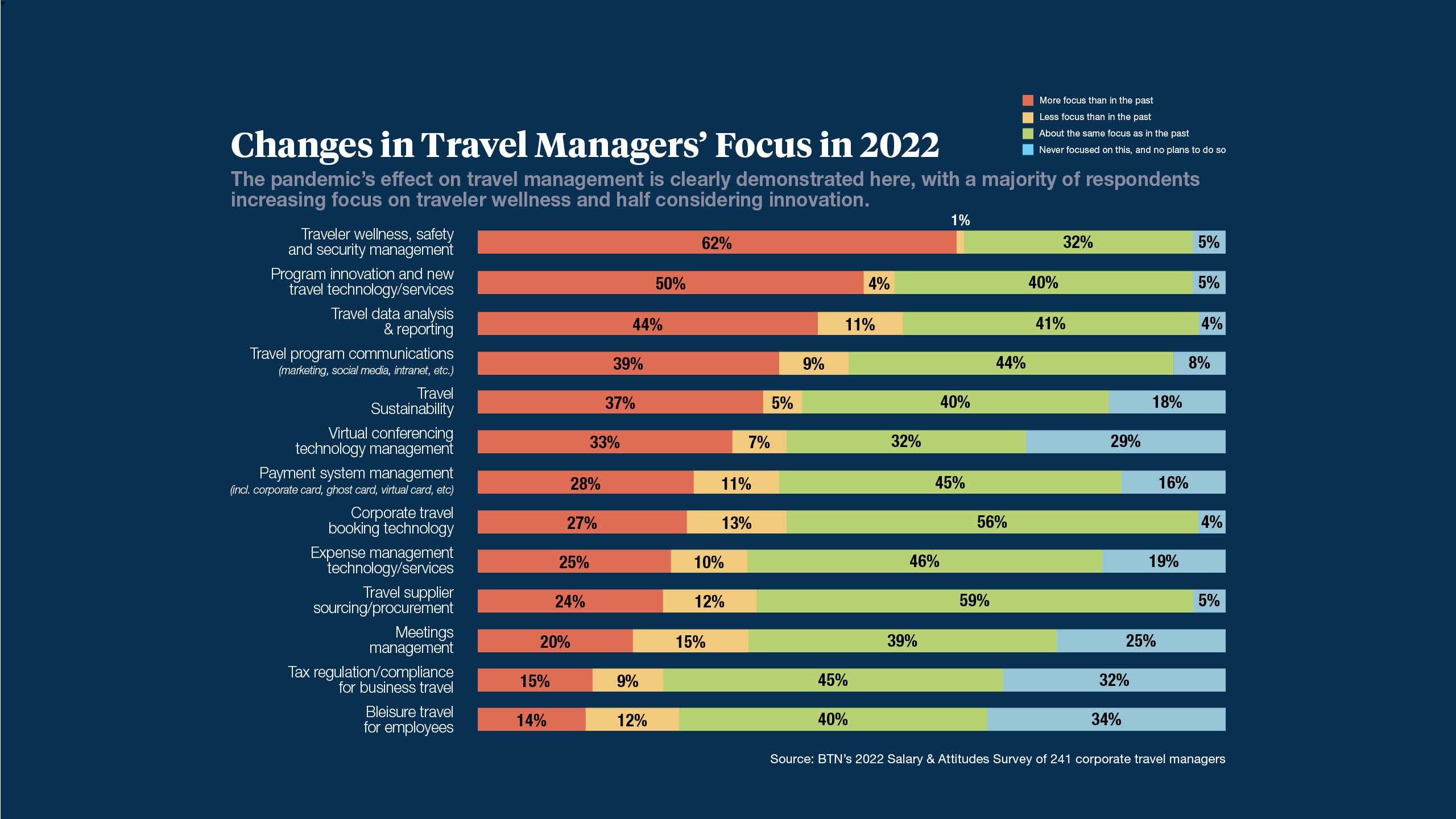
For some travel managers, 2022 was like waking up to a strange new world. Many old faces, reliable contacts and long-time colleagues had moved on, leaving them with new responsibilities to tackle on their own. Many have had to adjust to new bosses as they merged into other departments, such as procurement, human resources or meetings and events. Others have had to onboard groups of new, fresh-faced employees, some who never used a travel agency before.
“I am reeducating travelers how to travel,” said one. Some younger travelers, used to booking personal travel directly with suppliers or online travel agencies, also need an education on what their travel program (and travel management company) can offer. “Due to attrition, a new, younger employee base needs to understand a managed travel program,” explained another respondent.
What else has gained travel managers’ attention? Considering corporations’ sharpened focus on the environment, 37 percent of travel managers have put more emphasis on sustainability. And as Zoom, Teams and other tools for some have proved acceptable replacements for certain types of meetings, one-third of travel managers have increased their focus on virtual conferencing technology management.
How Am I Doing?
Perhaps one of the biggest differences since past studies is the way that travel manager performance is evaluated. Despite their strategic significance to the company, six in 10 travel managers still cited savings and cost avoidance as the No. 1 criterion as it relates to their performance measurement. But while that benchmark ranked at the top, it was down significantly in importance from the 2019 survey, when savings was chosen by 73 percent of respondents, indicating that there’s more to success than just cost-cutting. How else then are managers evaluated?
Nearly half (48 percent) said performance is measured by the travel department’s strategic contribution to the organization, intimating they are valued more for their participation in overall corporate decision-making, especially during times of crisis.
“I am being viewed as a more strategic partner within the organization, and having a voice outside my immediate manager,” wrote one respondent. Another said a recent positive outcome is “Having leadership understand what my role is and the value I contribute to the organization.” Travel management expert Maria Chevalier, who runs industry career growth group CTME Search Party, agreed that travel managers are getting their due. “The complexity of their jobs surfaced since Covid, and it became more apparent to management to how difficult it was,” she said.
Also in the top three performance criteria is traveler satisfaction, chosen by 47 percent of respondents. After two years of overseeing traveler health and safety, and considering the overall talent shortage, it is not surprising that keeping employees’ happy is high on the list.
With fewer bodies and more dependency on data, technology prowess also rose in importance. Roughly one-third called out program innovation as a key performance metric, and three in 10 selected technology implementation as an important factor in how their performance is evaluated.
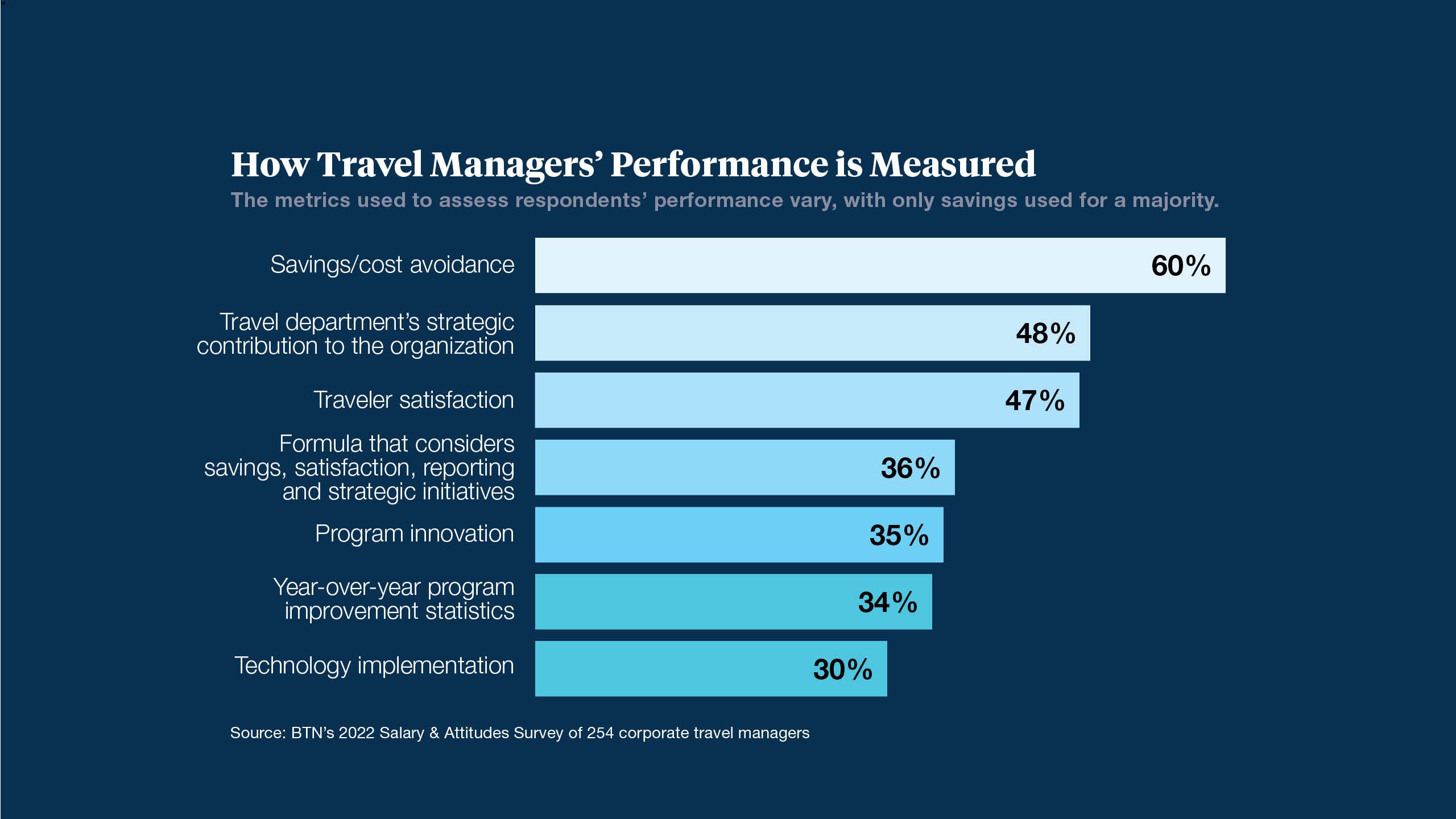
Job Satisfaction Stays High
Despite the expanding workload, most survey respondents generally were satisfied with their careers. Eight in 10 feel recognized by their organization and six in 10 are satisfied with their salary relative to responsibilities. Still, that leaves four in 10 who are dissatisfied with their compensation.
Respondents’ dissatisfaction with compensation is mostly related to expanded job function. “I am working dual roles, and working in areas outside of my normal responsibilities, and on special projects. Working wherever needed,” said one. “I’m taking on other functions not travel-related, more responsibility—no increase in pay,” said another.
Looking at respondents overall, the “Great Resignation” doesn’t seem to have hit the travel manager profession especially hard—or perhaps more likely, the ones who left did so already, and, therefore, didn’t respond to the survey.

Among current respondents, many aren’t seeking much change in their career paths over the next two years, perhaps because of limited opportunities in their organization. Nearly four in 10 (38 percent) see themselves working for their current employer, in the same position, while three in 10 expect to have the same employer, but a more advanced position.
Travel managers shouldn’t be taken for granted though, as some will seek new opportunities elsewhere. Nearly one-fifth see themselves in the same or a new position with a different employer, and considering the continued talent shortage, those are realistic goals. There are also those who prefer to work remotely and resent the move back to an office. “I would prefer to be fully remote, so I have no intention to go into the office three days a week,” said one travel manager. “This could become a performance issue which means I don’t know how long I’ll be in this company.”
Understandably, travel managers who are not satisfied with their salary levels are more restless with their current situations. More than two-thirds said they would be looking to advance in the next 24 months, via a few routes. Thirty-one percent said they saw themselves working for the same employer but in a more senior travel position. Seven percent said they would stick with their employer if they could find a role outside of travel. Twenty-nine percent said they would leave their employer to advance their career, either within travel management or in another role.

Covid Leaves its Mark
The overall increase in compensation for respondents, however, indicates that many travel managers are being recognized for their contributions. And they are happy to be more involved in overall corporate decision-making, as travel itself comes under closer scrutiny for its value (and risks) for the organization. Though the largest percentage of travel managers (28 percent) said the Covid-19 crisis did not change their job over the past two and half years, 27 percent said they are viewed more strategically and have more opportunities. “I am working with cross-functional teams on more strategic implementations which has been welcomed,” said one respondent. For others, however, the pandemic meant more work without added satisfaction, as more than one-fifth admitted they have more opportunity but strategically they are still in the same place.

Workplace Challenges
Several other themes emerged from travel managers’ comments. These include changing to a remote or a hybrid work environment, the challenges of recruitment, working with temporary labor and educating new staff members. All these changes came quickly, as travel managers shifted from an office environment with familiar faces to a home-based workplace with new colleagues to educate. “Switching from in-person to virtual, and now moving back to in-person,” has been a chore, explained one. Learning to work with a lot of new faces has also been tough. As one travel manager put it: “There is more stress overall, and working with new people in hospitality where the previous director of sales left or was laid off… delayed answers, emails, incomplete details, etc.”
What’s Next?
What will be the next big challenge for travel managers? “Recovery,” said Chevalier. “The pace is unpredictable.” With technology playing a greater part, travel managers shouldn’t take their renewed recognition by senior management for granted, advised Olympus Corp. executive director for global travel and expense strategy Pat Batra. Travel managers need to stay savvy and current, able to assess API integrations and various payment and expense systems, and use analytical software to improve decision-making. “They need to have a better ability to manage change, to divide their attention into multiple regions and more diverse needs … they need to know a bit of everything,” he said. Indeed, travel managers have their work cut out for them as business travel continues its comeback, while looking quite different from 2019 in so many ways.


